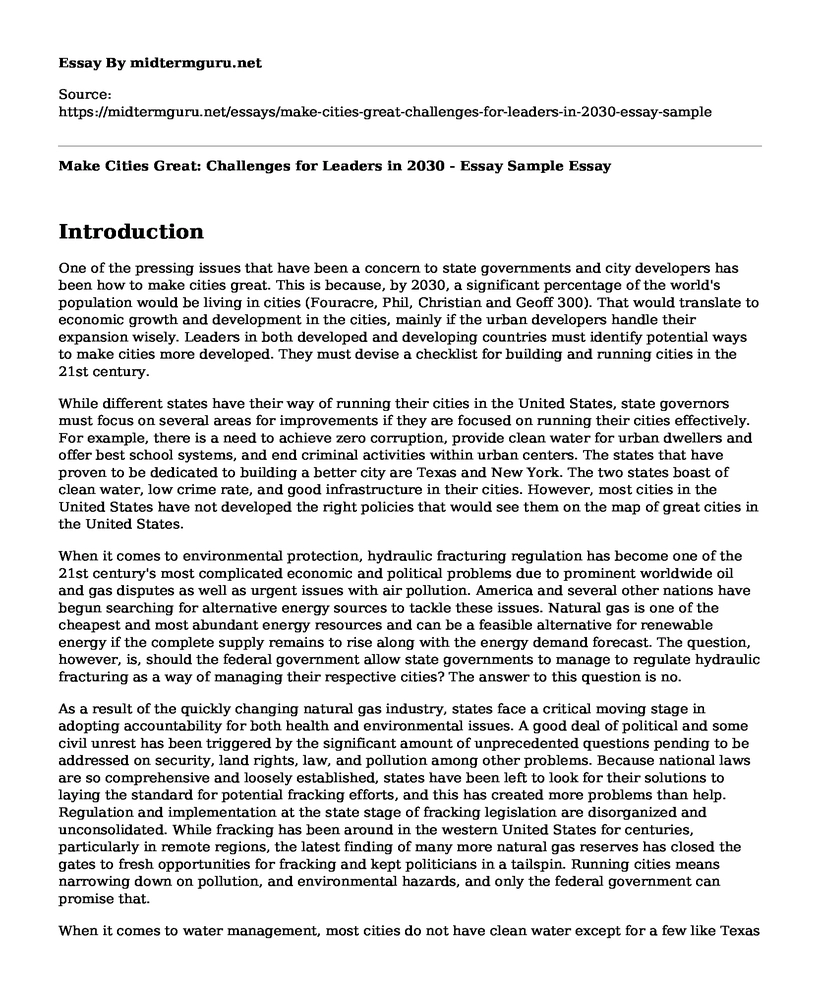Introduction
One of the pressing issues that have been a concern to state governments and city developers has been how to make cities great. This is because, by 2030, a significant percentage of the world's population would be living in cities (Fouracre, Phil, Christian and Geoff 300). That would translate to economic growth and development in the cities, mainly if the urban developers handle their expansion wisely. Leaders in both developed and developing countries must identify potential ways to make cities more developed. They must devise a checklist for building and running cities in the 21st century.
While different states have their way of running their cities in the United States, state governors must focus on several areas for improvements if they are focused on running their cities effectively. For example, there is a need to achieve zero corruption, provide clean water for urban dwellers and offer best school systems, and end criminal activities within urban centers. The states that have proven to be dedicated to building a better city are Texas and New York. The two states boast of clean water, low crime rate, and good infrastructure in their cities. However, most cities in the United States have not developed the right policies that would see them on the map of great cities in the United States.
When it comes to environmental protection, hydraulic fracturing regulation has become one of the 21st century's most complicated economic and political problems due to prominent worldwide oil and gas disputes as well as urgent issues with air pollution. America and several other nations have begun searching for alternative energy sources to tackle these issues. Natural gas is one of the cheapest and most abundant energy resources and can be a feasible alternative for renewable energy if the complete supply remains to rise along with the energy demand forecast. The question, however, is, should the federal government allow state governments to manage to regulate hydraulic fracturing as a way of managing their respective cities? The answer to this question is no.
As a result of the quickly changing natural gas industry, states face a critical moving stage in adopting accountability for both health and environmental issues. A good deal of political and some civil unrest has been triggered by the significant amount of unprecedented questions pending to be addressed on security, land rights, law, and pollution among other problems. Because national laws are so comprehensive and loosely established, states have been left to look for their solutions to laying the standard for potential fracking efforts, and this has created more problems than help. Regulation and implementation at the state stage of fracking legislation are disorganized and unconsolidated. While fracking has been around in the western United States for centuries, particularly in remote regions, the latest finding of many more natural gas reserves has closed the gates to fresh opportunities for fracking and kept politicians in a tailspin. Running cities means narrowing down on pollution, and environmental hazards, and only the federal government can promise that.
When it comes to water management, most cities do not have clean water except for a few like Texas and New York. analytically, considering the case in the supreme court over water regulation, I hold the argument that state governmnets should be allowed to have control over both surface and groundwater and distribute it equally to the general population unlike when it is left in the hands of the residents. Because of its program's efficacy, El Paso has become the best example for other societies dealing with water issues (Hutchuson n.p). Visitors from as far as Pakistan now comes to El Paso to see how a mixture of uncovering freshwater supplies and establishing a conservation culture has prevented the town from drying out.
Conclusion
Conclusively, developing cities need resources and good policies in place. Both the state and federal government should work together to better the lives of the citizens by putting in place the necessary resources for developing cities. Because many people are now settling in urban centers, city development will not only better the living standard of urban dwellers but also raise the economy of both the respective states and the United States as a whole.
Works Cited
Fouracre, Phil, Christian Dunkerley, and Geoff Gardner. "Mass rapid transit systems for cities in the developing world." Transport Reviews 23.3 (2003): 299-310. https://www.tandfonline.com/doi/abs/10.1080/0144164032000083095?journalCode=ttrv20
Hutchuson, William. Groundwater management in El Paso, Texas. Universal-Publishers, 2006. https://books.google.co.ke/books?hl=en&lr=&id=FP8V-yNRTdkC&oi=fnd&pg=PR3&dq=water+conservation+strategies+in+El+Paso.&ots=4q1PEfKfSc&sig=BLLMduqavOVx8g_MISKACmlTzww&redir_esc=y#v=onepage&q=water%20conservation%20strategies%20in%20El%20Paso.&f=false
Cite this page
Make Cities Great: Challenges for Leaders in 2030 - Essay Sample. (2023, Feb 02). Retrieved from https://midtermguru.com/essays/make-cities-great-challenges-for-leaders-in-2030-essay-sample
If you are the original author of this essay and no longer wish to have it published on the midtermguru.com website, please click below to request its removal:
- Sustainability of Urban Growth - Essay Example
- Paper Example on Humanitarian Organizations
- Essay Sample on Social Hierarchy and Power
- Baby Pram Breaks, Kylie's Nanny in the Line of Fire - Case Study
- Annotated Bibliography on Race, Death, & Justice
- Baby Boomer vs. Millennial: Motivation in the Multigenerational Workforce - Essay Sample
- Embrace Diversity for Improved Lifestyles: Why Acceptance Matters - Research Paper







